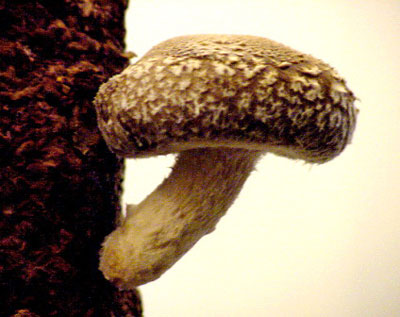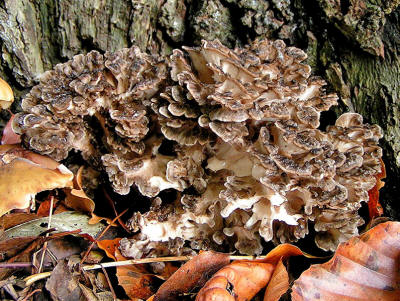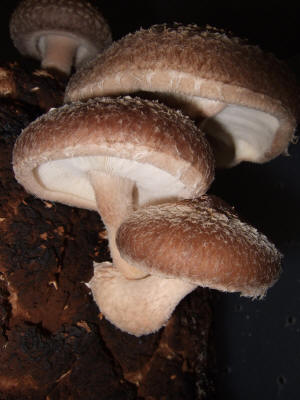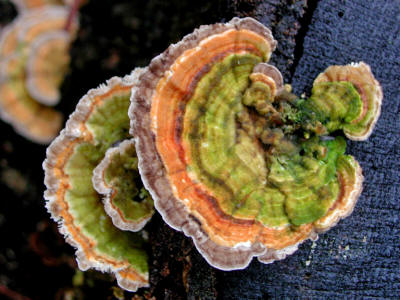|
|
|
by Natasha Longo from PreventDisease Website
The Health Benefits of Mushrooms. So What Happened?
We've become a species that has chosen to forget so much about health.
We can whine and complain all we want about how governments and corporations have helped us cater to that mentality, but ultimately we have only ourselves to blame.
Mushrooms have long been celebrated as a
source of powerful nutrients, having the antioxidant and amino acid
profile of some of the healthiest foods, yet we largely ignore this
amazing food in the produce aisle. When it comes to health, the
almighty mushroom is indeed something to worship.
It is a hidden kingdom. In some ways, mushrooms are more closely related to animals than plants. Just like us, mushrooms take in oxygen for their digestion and metabolism and "exhale" carbon dioxide as a waste product. Fungal proteins are similar in many ways to animal proteins. The part of the fungus that we see is only the “fruit” of the organism.
Mushrooms grow from spores, not seeds,
and a single mature mushroom will drop as many as 16 billion spores!
Western science and medicine are finally
beginning to recognize and utilize some of the
medicinally active
compounds in mushrooms and elucidate their modes of action.
The effect can either be of,
This modulation
of immune function in either direction is confounding to Western
Medicine and Pharmacological paradigms which are accustomed to
medicines that always "push" in one direction.
UV light is utilized in the production of these mushrooms. For example, a four-ounce (112 grams) serving of Maitake mushrooms (below image) produced by the Hokto-patented methodology contains 85% of the Daily RDA (Recommended Daily Allowance) for Vitamin D.
Many people today are deficient in Vitamin D and there is
evidence that Vitamin D deficiencies may be linked to cancer and
other disease states.
Mushrooms are,
...yet they provide important nutrients, including,
...and more.
Mushrooms provide a number of nutrients:
Mushrooms are also a source of important minerals:
Beta-glucans, found in numerous mushroom species, have shown marked immunity-stimulating effects, contribute to resistance against allergies and may also participate in physiological processes related to the metabolism of fats and sugars in the human body.
The beta-glucans contained in oyster,
shiitake and split gill mushrooms are considered to be the most
effective.
In particular, recent studies have shown the ability of shiitake mushrooms (below image) to help protect us against cardiovascular diseases (including atherosclerosis) by preventing too much immune cell binding to the lining of our blood vessels.
In order for immune cells and other materials to bind onto our blood vessel linings, certain protein molecules - called adhesion molecules - must be produced and sent into action.
By helping to block the adhesion
molecule production process, substances in shiitake mushrooms can
help protect our blood vessels.
Although conducted on laboratory animals (female rats) rather than humans, this study found the iron in dried shiitake mushroom to be equally as bioavailable as supplemental iron in the form of ferrous gluconate. (Ferrous gluconate is a very commonly used low-dose iron supplement.)
While we don't usually spotlight research on laboratory animals, we found this result to be especially promising for individuals who consume little or no animal products and are often looking for foods that can supply valuable amounts of bioavailable iron. Shiitake mushrooms can be one of the most sustainable foods in your diet!
While the majority of shiitake mushrooms produced worldwide have been grown on sawdust block in a non-natural setting, it is fully possible for shiitake mushrooms to be produced on natural hardwood logs in a forest setting.
This approach to shiitake mushroom production is called "forest farming" and it has become an especially popular way of growing shiitake mushrooms in the U.S., where there are now more than 200 shiitake mushroom growers. Unfortunately, forest farming is not a requirement for organic certification of shiitake mushrooms.
However, all of the plant crop standards in the National Organics Program regulations apply to shiitake mushroom production, and so the combination of these two features - certified organic shiitake mushrooms that have also been forest farmed - can make a great food choice in terms of sustainable agriculture.
Just look for the USDA's organic logo on your shiitake mushrooms to determine if they are certified organic. Then check for information about forest farming on the packaging.
If no information is provided, there is a good chance that your shiitake mushrooms were not forest farmed.
For this reason, we encourage you to ask
your store staff or contact the product manufacturer to determine if
your shiitake mushrooms were grown on hardwood logs in a natural
forest environment.
In fact, the immune support track record for this mushroom is fascinating. On the one hand, numerous studies have shown the ability of whole shiitake mushrooms to help prevent excessive immune system activity.
On the other hand, an equal number of studies have shown the ability of shiitake mushrooms to help stimulate immune system responses under certain circumstances. In other words, from a dietary perspective, shiitake mushrooms appear able to enhance immune function in both directions, giving it a boost when needed, and cutting back on its activity when needed.
It's important to note that dietary shiitake mushroom intake - unlike intake of medicinal shiitake extracts - has not been shown to be strongly suppressive of the immune system or strongly activating. From our perspective, this finding makes sense. We wouldn't want our everyday foods to strongly suppress or strongly activate any body system.
What we would want from our foods is
support of body systems under a variety of circumstances - and that
is exactly what we get from shiitake mushrooms with respect to our
immune system.
Among their many important activities, macrophage cells are responsible for identifying and clearing potentially cancerous cells from the body. In order to carry out this task, they need to be "activated" in a particular way.
(In more scientific terms, their activated phenotype needs to reflect a higher level of interleukin 1-beta and tumor necrosis factor alpha, and a lower level of interleukin 10.)
Shiitake mushrooms are able to help
macrophage cells achieve this activated profile so that they can do
a better job clearing potentially cancerous cells. Researchers refer
to this result as an "anti-cancer immunity" that is enhanced by
shiitake mushroom intake.
The first of these areas is cholesterol reduction. d-Eritadenine (also called lentinacin, or lentsine, and sometimes abbreviated as DEA) is one of the most unusual naturally occurring nutrients in shiitake mushrooms that has repeatedly been shown to help lower total blood cholesterol.
This nutrient is actually derived from
adenine - one of the building blocks (nucleotides) in the mushroom's
genetic material (DNA). The beta-glucans in shiitake mushrooms are
also very likely to contribute to its cholesterol-lowering impact.
Shiitake mushrooms are a very good source of three key antioxidant minerals: manganese, selenium, and zinc. They also contain some unusual phytonutrient antioxidants. One of the best studied is ergothioneine (ET). This unique antioxidant is derived from the amino acid histidine, although it's unusual since it contains a sulfur group of molecules that are not present in histidine itself.
In studies on ET and our cells' oxidative stress levels, one fascinating finding has been the special benefits of ET for cell components called mitochondria. Mitochondria use oxygen to produce energy for the cell. Heart cells have greater concentrations of mitochondria than most any other cell type in the body.
For this reason, researchers believe
that ET may be one of the key nutrients from shiitake mushrooms that
provide us with cardiovascular support.
For this reason, our understanding of the anti-cancer benefits of shiitake mushrooms as a whole, natural food is still preliminary.
But based on research to date, we believe that adding shiitake mushrooms to your diet is likely to offer you anti-cancer benefits, especially with respect to prevention of prostate cancer, breast cancer, and colon cancer.
These components have been collectively referred to as "anti-tumor mycochemicals" provided by shiitake mushrooms. Researchers have speculated that more than 100 different types of compounds in shiitake mushrooms may work together to accomplish these anti-tumor results.
While the unique polysaccharides in
shiitake mushrooms were first thought to be its primary anti-cancer
compounds, scientists are now convinced that shiitake provides many
non-polysaccharide substances that have anti-tumor effects.
This includes rheumatoid arthritis
(RA), an area that has begun to interest shiitake mushroom
researchers. Although research in this area is preliminary, we
expect to see large-scale human studies confirming the benefits of
shiitake mushrooms for prevention of RA.
While we have yet to see large-scale
human studies on whole food intake of shiitake mushrooms and
decreased susceptibility to colds, flu or other problems related to
unwanted activity of micro-organisms, this is a very likely area for
future food research and discovery of health benefits.
|





